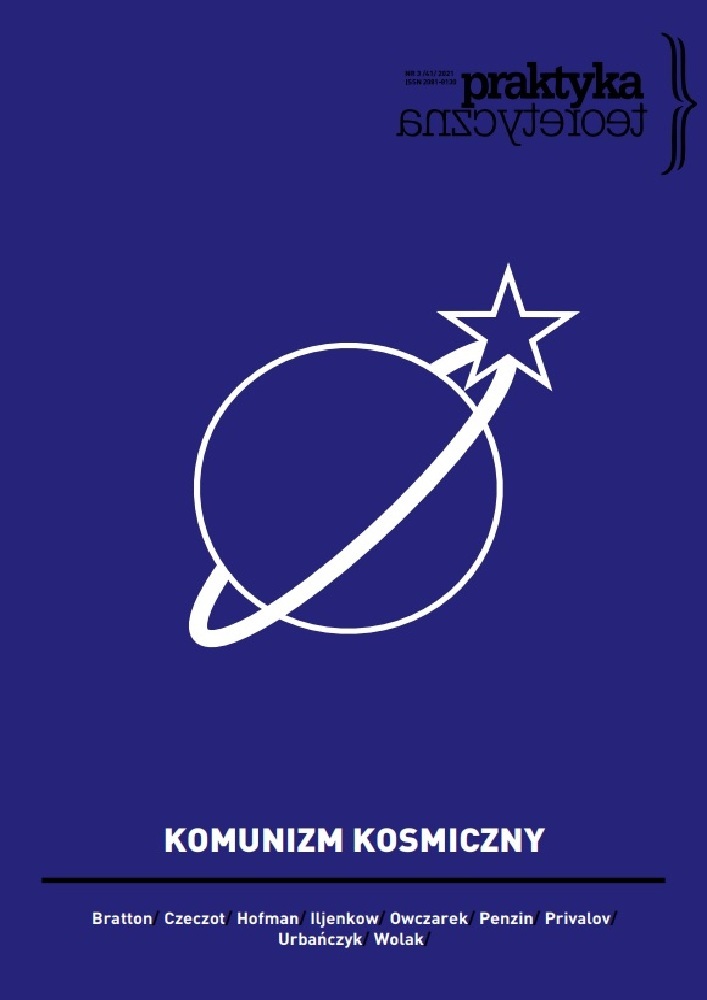Abstract
The article argues for contemporary relevance of "Cosmology of the Spirit" by the outstanding Soviet philosopher Evald Ilyenkov, and explores its historical and intellectual contexts. This short treatise was written in the first half of the 1950s, but only published posthumously in the 1980s as it was too heretical to be published in the author’s lifetime. The text was heretical because of its enormous speculative drive. Addressing the physicist idea of the “entropic death of the universe” and using a combination of materialist dialectics and Spinoza’s concept of attribute, Ilyenkov claimed that thought is a necessary attribute of matter as it is able to prevent the terminal entropy of the universe. The paper uses the ideas of Ilyenkov’s cosmology in order to critically address contemporary currents of “speculative” philosophy.
References
Arystoteles. 1984. Metafizyka. Tłum. Kazimierz Leśniak. Warszawa: Wydawnictwo Naukowe PWN.
Badiou, Alain. 2018. Krótki traktat z ontologii przejściowej. Warszawa: Biblioteka Kwartalnika Kronos.
Bakhurst, David. 1997. “Meaning, Normativity, and the Life of the Mind.” Language & Communication 17(1): 33–51. https://doi.org/10.1016/S0271-5309(96)00027-4.
Engels, Fryderyk. 1972. Dialektyka przyrody. W Marks, Karol i Fryderyk Engels, Dzieła, t. 20. Warszawa: Książka i Wiedza.
Gillespie, Sam. 2001. “Placing the Void – Badiou on Spinoza.” Angelaki: Journal of the Theoretical Humanities 6(3): 63–77. https://doi.org/10.1080/09697250120087941.
Groys, Boris. 2009. The Communist Postscript. Tłum. Thomas Ford. London: Verso.
Hadot, Pierre. 2004. Twierdza wewnętrzna. Wprowadzenie do „Rozmyślań” Marka Aureliusza. Tłum. Piotr Domański. Kęty: Wydawnictwo Antyk.
Heidegger, Martin. 1958. What is Philosophy? Tłum. Jean T. Wilde and William Kluback. New York: Twayne Publishers.
Fiodorow, Nikołaj. 2012. Filozofia wspólnego czynu. Tłum. Michał Milczarek i Cezary Wodziński. Kęty: Wydawnictwo Marek Derewiecki.
Iljenkow, Ewald. 1978. Logika dialektyczna: eseje o historii i teorii. Tłum. Wiktoria Krzemień. Warszawa: Państwowy Instytut Wydawniczy.
Iljenkow, Ewald. 2021. “Kosmologia ducha. Próba stworzenia ogólnego zarysu obiektywnej roli myślącej materii w systemie światowych interakcji (filozoficzno-poetycka fantasmagoria, wsparta na zasadach materializmu dialektycznego).” Tłum. Krystian Szadkowski. Praktyka Teoretyczna 41(3): 19–48. https://doi.org/10.14746/prt.2021.3.2.
Iljenkow, Ewald. 1962. “Żizn.” Encyclopedia of Philosophy (2): 133–134. Moscow: Soviet Encyclopedia.
Iljenkow, Ewald. 2017. “Cosmology of the Spirit.” Tłum. Giuliano Vivaldi. Stasis 5(2): 164–190.
Kuzniecow, Pobisk. 1955. “Jeszcze raz o wtorom zakonie tiermodinamiki i "tiepłowoj smierti" Wsielennoj.” http://www.устойчивоеразвитие.рф/files/Kuznetsov/Library/1955-OnceAgain.pdf.
Magun, Artemy. 2014. “Negativity in Communism: Ontology and Politics.” Russian Sociological Review 13(1): 9–25.
Mareyev, Sergei. 2005. „Cosmology of Mind.” Studies in East European Thought 57(3–4): 249–259. https://doi.org/10.1007/s11212-005-1412-4.
Mareyev, Sergei. 2015 E.W.Iljenkow: żytʹ fiłosofijej. Moscow: Akadiemiczeskij projekt.
Meillassoux, Quentin. 2015. Po skończoności. Esej o koniecznej przygodności. Tłum. Piotr Herbich. Warszawa: Biblioteka kwartalnika Kronos.
Moore, Jason. 2021. Antropocen czy kapitałocen? Natura, historia i kryzys kapitalizmu. Tłum. Krzysztof Hoffmann, Patryk Szaj i Weronika Szwebs. Poznań: WBPiCAK.
Oittinen, Vesa. 2005. “Evald Il’enkov as an Interpreter of Spinoza.” Studies in East European Thought 57(3–4): 319–338. https://doi.org/10.1007/s11212-005-1408-0.
Penzin, Alexei. 2016. “Stalin Beyond Stalin? A Paradoxical Hypothesis of Communism by Alexandre Kojève and Boris Groys.” Crisis and Critique 3(1): 300–340.
Vivaldi, Giuliano. 2017. “A Commentary on Evald Ilyenkov’s Cosmology of the Spirit.” Stasis 5(2): 192–203. https://doi.org/10.33280/2310-3817-2017-5-2-192-203.
Zabelin, Igor. 1970. Czełowiek i czełowieczestwo. Oczerki. Moscow: “Sov. Pisatel”.
License
“Theoretical Practice” seeks to put into practice the idea of open access to knowledge and broadening the domain of the commons. It serves the development of science, thinking and critical reflection. The journal is published in open-access mode under the CC-BY-NC-SA 4.0 license (detail available here: http://creativecommons.org/licenses/by-nc-sa/4.0/). Articles published in the journal may be freely distributed, stored, printed and utilized for academic and teaching purposes without restrictions.
They should not be, however, used for any commercial purposes or be reconstructed into derivative creations. Access to the journal may not be limited or offered for a fee by any third party.
Prospective authors are obliged to fill in, sign and send back the publishing contract compliant with the CC licencing. [PL.pdf, PL.doc, EN.pdf,EN.doc].
According to this contract, authors grant the journal a non-exclusive right to publish their work under the creative commons license (CC-BY-NC-SA 4.0) without any financial obligation on both sides of the contract.
Before submission authors should make sure that derivative materials they use are not protected by copyright preventing their non-commercial publication. Authors are responsible for any respective copyright violations.
